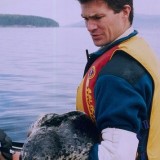by Dr. Peter Ross
Since being hired 13 years ago as a Research Scientist at Fisheries and Oceans Canada (DFO), I have been fortunate to conduct research on such magnificent creatures as killer whales, beluga whales, harbour seals and sea otters. I have visited some of the wildest parts of coastal British Columbia, Arctic Canada and further afield. I have been humbled by the power of Mother Nature as we deployed teams to explore and better understand the lives of creatures beneath the surface of the ocean. I have marveled at the evolutionary adaptations of marine mammals to an existence at the interface of land, sea and atmosphere. And as a scientist, I have come to learn that I possess but rudimentary powers of observation when it comes to the mystery and beauty of a vast ocean. For all of this, I remain eternally grateful.
A blend of challenging field work and cutting-edge laboratories has helped me to look into the lives of fish and marine mammals, and the ways in which some of the 25,000 contaminants on the domestic market affect their health. Our research has drawn on the combined expertise of dedicated technicians, biologists, vessel operators and aboriginal colleagues, ultimately leading to scientific publications now available around the world. This is knowledge that informs policies, regulations, and practices that enable us to protect the ocean and its resources, both for today’s users, and for future generations.
I am thankful for the rich array of opportunities aboard Canadian Coast Guard ships and small craft, alongside Fisheries Officers, chemists, habitat biologists and managers, together with colleagues, technicians, students and members of aboriginal communities. I have enjoyed weaving stories of wonder on such issues as the health of killer whales, effects of flame retardants on beluga whales, hydrocarbons in sea otter habitat, trends in priority pollutants in harbour seals, impacts of current use of pesticides on the health of salmon, the identification of emerging contaminants in endangered species and risk-benefit evaluation of traditional sea foods of First Nations and Inuit peoples.
Past scientific discoveries such as high levels of PCBs in Inuit foods, dioxins in pulp and paper mill effluent, and DDT-associated eggshell thinning in seabirds formed the basis for national regulations and an international treaty (the Stockholm Convention) that have led to cleaner oceans and safer aquatic foods for fish, wildlife and humans. Canada was a world leader in spearheading this profoundly important treaty, drawing on ground-breaking scientific research in tandem with the knowledge of aboriginal communities.
I am thankful to my friends, family, supporters and colleagues, who have always been there to converse, share, learn and teach – in the laboratory, in the field, in the cafeteria, in the hallway. These people have made it all worthwhile.
It is with deep regret that I relay news of my termination of employment at Fisheries and Oceans Canada and the loss of my dream job. It is with even greater sadness that I learn of the demise of DFO’s entire contaminants research program – regionally and nationally. It is with apprehension that I ponder a Canada without any research or monitoring capacity for pollution in our three oceans, or any ability to manage its impacts on commercial fish stocks, traditional foods for over 300,000 aboriginal people and marine wildlife.
Canada’s silence on these issues will be deafening this summer and beyond.
For more information about Ross’ work:
Silent Snow: The Slow Poisoning of the Arctic, by Marla Cone, published by Grove/Atlantic http://www.groveatlantic.com/?title=Silent+Snow
http://articles.latimes.com/2001/feb/16/news/mn-26134
http://articles.latimes.com/1996-05-12/news/mn-3403_1_immune-system
http://articles.latimes.com/2003/jun/19/local/me-polarbears19
http://www.environmentalhealthnews.org/ehs/news/contaminated-killer-whales
http://www.environmentalhealthnews.org/ehs/news/2012/perus-dolphin-die-off

